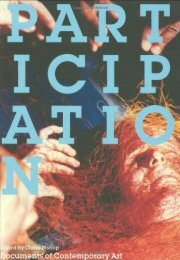New Aesthetic New Anxieties - Institute for the Unstable Media
New Aesthetic New Anxieties - Institute for the Unstable Media
New Aesthetic New Anxieties - Institute for the Unstable Media
You also want an ePaper? Increase the reach of your titles
YUMPU automatically turns print PDFs into web optimized ePapers that Google loves.
things and communities. Experimental art and critical projects might attempt to thinkthrough <strong>the</strong>se infrastructures by playing with and breaking <strong>the</strong> logics and medialaf<strong>for</strong>dances differently. We are emphasizing <strong>the</strong> urgency precisely because all ofthis plays out on <strong>the</strong> topos provided by computational technologies, on loose, hazyneoliberalized social fabrics, which in a similar way to software, render older <strong>for</strong>ms ofattachments and subject positions irrelevant. As Gelernter argues:No moment in technology history has ever been more exciting ordangerous than 'now.' As we learn more about now, we know less about<strong>the</strong>n. The Internet increases <strong>the</strong> supply of in<strong>for</strong>mation hugely, but <strong>the</strong>capacity of <strong>the</strong> human mind not at all… The effect of nowness resembles<strong>the</strong> effect of light pollution in large cities, which makes it impossible to see<strong>the</strong> stars. A flood of in<strong>for</strong>mation about <strong>the</strong> present shuts out <strong>the</strong> past(Gelernter 2010).Irruptions of <strong>the</strong> Digital into <strong>the</strong> Real, Economics into ‘Culture’Writing in <strong>the</strong> Dutch context, we understand <strong>the</strong> contemporary period’s inattention to<strong>the</strong> effects on <strong>the</strong> subject of neoliberal transition as symptomatic of <strong>the</strong> success of itsideological takeover. Emerging aes<strong>the</strong>tic <strong>for</strong>ms and critical practices can raiseimportant questions about <strong>the</strong> autonomy and continuity of <strong>the</strong> human agent in thispresent where matters of autonomy <strong>for</strong> cultural practitioners and critics are becomingincreasingly stressed and questioned.In such contexts, moving toward a technological politics is necessary. Consider <strong>for</strong>example that <strong>the</strong> auto-curation of <strong>the</strong> stream's processing – Tumblr blogs, Twitterfeeds, and so <strong>for</strong>th - does not just provide in<strong>for</strong>mation to <strong>the</strong> user, but also activelyconstructs, directs, and even newly creates, significant socio-cognitive conditions <strong>for</strong><strong>the</strong> subjectivity of <strong>the</strong> real-time stream, a kind of algorithmic humanity. This is how <strong>the</strong>subject is captured by <strong>the</strong> <strong>New</strong> <strong>Aes<strong>the</strong>tic</strong>, whose comportment seems hooked to <strong>the</strong>minimization of risk, and shot through with projective sentimentality. We feelphenomena such this might, as Derrida has argued,Oblige us more than ever to think <strong>the</strong> virtualization of space and time, <strong>the</strong>possibility of virtual events whose movement and speed prohibit us morethan ever (more and o<strong>the</strong>rwise than ever, <strong>for</strong> this is not absolutely andthoroughly new) from opposing presence to its representation, 'real time'to 'deferred time,' effectivity to its simulacrum, <strong>the</strong> living to <strong>the</strong> non-living,in short, <strong>the</strong> living to <strong>the</strong> living-dead of its ghosts (Derrida 1994: 212).Software changes <strong>the</strong> games of cultural work and production; <strong>the</strong> lesson takes a longtime to learn and is complicated by o<strong>the</strong>r parallel conditions. The neoliberal economy isnot just driven by software as a kind of symbolic machine but instead is made ofsoftware, as Galloway has emphasized (2012a). It fosters in a logic of “<strong>the</strong> extractionof value based on <strong>the</strong> encoding and processing of ma<strong>the</strong>matical in<strong>for</strong>mation” (10). Butthis is not just to say that software is a kind of conceptual motor underpinning <strong>the</strong>economy, and useful <strong>for</strong> thinking it through: “more and more, software is <strong>the</strong> thingwhich is directly extracting value” (10). For Galloway, this software condition, like our57








